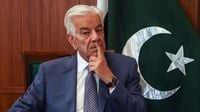On Friday, May 9, 2025, Pakistan's Defence Minister Khawaja Asif made headlines after delivering a controversial statement regarding the recent drone attacks by India. Speaking in the National Assembly, Asif claimed that the Indian drones were deployed to detect the locations of Pakistan's air defense units, and that the Pakistani Army chose not to intercept them to avoid revealing sensitive military sites.
Asif's remarks came in the wake of India's Operation Sindoor, which targeted terrorist camps in Pakistan and Pakistan-occupied Kashmir (PoK) on May 7. During this operation, India reportedly used Israeli-developed Harpy kamikaze drones to conduct strikes across several Pakistani cities. The Indian government stated that the attacks were aimed at neutralizing threats posed by these camps.
In his address, Asif stated, "The drone attack was mounted to detect our locations. It's a technical thing that I can't explain. We didn't intercept the drones, so that the location of our aerial defense units won't get leaked." This assertion raised eyebrows not only due to its technical implications but also because it starkly contradicted earlier claims made by the Pakistan Army regarding their ability to shoot down Indian drones.
Following Asif's comments, Pradip Bhandari, a spokesperson for India's Bharatiya Janata Party (BJP), took to social media to ridicule the minister. Bhandari shared a clip of Asif's speech on X (formerly Twitter), commenting, "Khawaja Asif has lost it completely. 'We didn't intercept Indian drones because we didn't want to leak our locations,' says Pakistan's Defence Minister. When Indian missiles hit, even your missile defense locations got exposed -- not by your choice, but by India's precision." Bhandari's post quickly gained traction, reflecting widespread skepticism about Asif's rationale.
Asif's statement was particularly controversial given that the Pakistani Army had previously claimed to have intercepted and shot down 25 Indian drones since the night of May 7. Lt Gen Ahmed Sharif Chaudhry, the Director General of Inter-Service Public Relations (ISPR), acknowledged that the drone attacks resulted in civilian casualties, including one death and injuries in Rawalpindi and an area near Karachi.
Critics of Asif's statement pointed out the irony of his claim that failing to intercept the drones was a strategic decision to protect military locations. As one social media user quipped, "I decided not to kill the mosquitos in my bedroom because I am afraid the mosquito will realize I’m in the bed." Another user sarcastically remarked, "So they let their people die in the interest of military installations? Damn. How being poor changes your interests. They have turned their people into cannon fodder. Jinnah would be so proud!"
Adding to the controversy, Asif had previously stated that Indian pilots were refusing to fly warplanes, which he claimed was the reason for the drone strikes. This comment further fueled doubts about the credibility of his statements. During an interview with Sky News, Asif acknowledged that Pakistan had been funding terrorist organizations for decades, saying, "Well, we’ve been doing this dirty work for the United States and the West, including Britain, for about three decades now." This admission has raised questions about Pakistan's military and political strategy in the region.
In another instance, Asif told Al Arabiya that Pakistan had invited international media and observers to inspect sites to verify the absence of terrorist training camps, asserting, "We invited the international media and observers. They can come and inspect these sites (to see) if there are training camps over there." This statement, however, stands in stark contrast to the ongoing tensions and accusations between India and Pakistan regarding cross-border terrorism.
The backdrop of these events is critical, as India has been increasingly vocal about its military capabilities and readiness to respond to perceived threats from Pakistan. The use of advanced military technology, such as the S-400 defense system, has bolstered India's position in the region, making it imperative for Pakistan to navigate these military confrontations carefully.
As the situation unfolds, the credibility of Pakistan's military leadership is under scrutiny. Asif's remarks have not only drawn ridicule but have also raised serious concerns about the effectiveness of Pakistan's defense strategy. The stark contradictions between his statements and those of the military raise questions about the internal coherence of Pakistan's defense posture.
As tensions continue to simmer between the two nations, the implications of Asif's comments could have far-reaching effects on Pakistan's military reputation and its diplomatic relations with India. The ongoing conflict underscores the need for both nations to engage in dialogue to address their differences and work toward a peaceful resolution.
In conclusion, Khawaja Asif's controversial statement regarding the non-interception of Indian drones has ignited a firestorm of criticism and debate. As the situation evolves, the international community will be watching closely to see how both India and Pakistan respond to the challenges posed by their ongoing rivalry.





